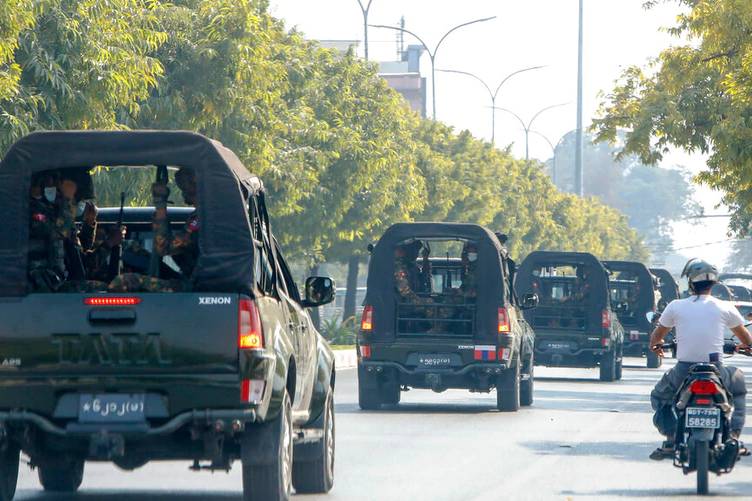Secretary-General Antonio Guterres said Wednesday that the United Nations would work to mobilize key international actors to pressure Myanmar “to make sure” that the country’s military coup fails.
“It is absolutely unacceptable after elections — elections that I believe took place normally. And after a large period of transition, it is absolutely unacceptable to reverse the result of the elections and the will of the people,” the U.N. chief told an online discussion with The Washington Post.
Myanmar’s military, the Tatmadaw, seized power Monday, declaring a yearlong state of emergency and detaining de facto leader Aung San Suu Kyi and President U Win Myint, among others.
The coup took place following days of tension between the military and the ruling National League for Democracy (NLD), which won the November elections. The Tatmadaw has refused to accept the results, alleging massive election fraud.
Guterres said if anything, NLD leader Aung San Suu Kyi “was too close to the military,” defending its brutal offensive against Rohingya Muslims that caused nearly a million of them to flee to neighboring Bangladesh three years ago.
“I hope that democracy will be able to make progress again in Myanmar,” Guterres said. “But for that, all the prisoners must be released, the constitutional order must be reestablished, and I hope that the international community will be able to come together.”
Charges filed
Earlier Wednesday, authorities in Myanmar filed charges against Aung San Suu Kyi for allegedly illegally importing and using six unregistered walkie-talkie radios found during a search of her home in the capital, Naypyitaw.
Her NLD party said on Facebook that she has been ordered held for two weeks. It also said authorities had raided party offices in multiple regions of the country.
Win Myint was separately charged with violating coronavirus containment measures while campaigning for last November’s election.
In Washington, State Department spokesman Ned Price said the U.S. was “disturbed” by reports of the new charges.
“We call on the military to immediately release them all, and all the civilian and political leaders, journalists and detained human rights activists. And to restore the democratically elected government to power, as President Biden has said the military seizure is a direct assault on the country's transition to democracy and the rule of law,” Price said.
On Tuesday, the State Department made the legal determination that the military’s actions constituted a “coup,” triggering certain restrictions on foreign assistance to Myanmar.
Top administration officials have said the United States “will take action against those responsible if these steps are not reversed,” while continuing vital humanitarian and development programs.
Growing condemnation, resistance
Foreign ministers from the G-7 group of nations issued a joint condemnation of the coup on Wednesday.
A police officer guards outside closed doors of National League for Democracy party office decorated with pictures of Aung San…
A police officer guards closed doors of National League for Democracy party offices, decorated with pictures of Aung San Suu Kyi, right, flanked by party patron Tin Oo, in Mandalay, Myanmar, Feb. 3, 2021.
"We are deeply concerned by the detention of political leaders and civil society activists, including State Counselor Aung San Suu Kyi and President Win Myint, and targeting of the media,” the foreign ministers of Canada, France, Germany, Italy, Japan and the United States said in a statement.
"The November election results must be respected, and Parliament should be convened at the earliest opportunity,” they added.
Workers at 70 hospitals and medical departments in 30 towns held a work stoppage to protest the coup, while a new group, the Myanmar Civil Disobedience Movement, criticized the army for putting its own interests before the people’s.
Troubled history
Myanmar, also known as Burma, has long struggled between civilian and military rule, but until the coup it had been enjoying a hopeful transition to democracy.
A British colony until 1948, the country was ruled by military-backed dictators from 1962 until 2010.
An uprising in 1988 pushed for an election in 1990, which the NLD won in a landslide. But the elected members of Parliament were imprisoned, and the dictatorship continued.
Aung San Suu Kyi, the daughter of Myanmar's assassinated independence hero, General Aung San, emerged as a leader in the pro-democracy rallies and in the NLD. She was awarded the Nobel Peace Prize in 1991 while under house arrest.
In 2010, Senior General Than Shwe announced the country would be handed over to civilian leaders, who included retired generals. They freed political prisoners, including the lawmakers from the NLD, and Aung San Suu Kyi, who was elected in a 2012 by-election and later became the state counselor of Myanmar.
While popular among Myanmar’s Buddhist majority, Aung San Suu Kyi, 75, has seen her international reputation decline over her government’s treatment of the country's mostly Muslim Rohingya minority.
In 2017, an army crackdown against the Rohingya, sparked by deadly attacks on police stations in Rakhine State, led hundreds of thousands of them to flee to neighboring Bangladesh, where they remain.
The International Criminal Court is investigating Myanmar for crimes against humanity.
VOA’s Margaret Besheer and Nike Ching contributed to this report.
(VOA)

